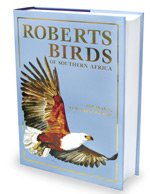English Names
Download PDF [114 KB]

The issue of standardising English common names has already been the subject of considerable debate. We don’t want to revisit this here; suffice to say that the timing of the Roberts revision coincides with a major effort internationally to derive a single list of unambiguous common names for all birds. This will make the lives of all birders much easier in the long term, outweighing the short-term confusion caused by the name changes. The IOC initiative is still not complete, but the African regional list has been submitted to the central committee. We have followed the decisions of the African sub-committee. Many of the final decisions are not entirely logical (e.g. using ‘korhaan’ for southern African small bustards and ‘bustard’ for their relatives found farther north in Africa), but common usage was a key criterion for selecting a given name.
For those who remain unhappy about some or all of the changes, we offer the following points. Southern Africa was well represented on the African sub-committee (two of five members), and many southern African names have prevailed over their (geographically) more widespread counterparts used elsewhere on the continent. Also, this process has not been without robust debate, even within the sub-committee. The attached list has to be seen as a best compromise to achieve the overall goal of an unambiguous list. And those die-hards who refuse to consider changes can continue to call birds whatever they like!
Afrikaans Names
Voorgestelde suider Afrikaanse voëlnaamlys Maart 2008 © Afrikaanse wêreldlys
Download PDF [313 KB]
Hierdie dokument bevat die lys van suider Afrikaanse voëlname wat voorgestel word vir algemene gebruik. Dit sluit aan by ‘n lys wat tans die spesies van Afrika, die Indiese Oseaan, wes-Palearktiese en ander gebiede insluit. Die suider Afrikaanse lys word vir ‘n beperkte tyd deur middel van hierdie webblad bekend gestel sodat voorstelle daarop ontvang kan word. Dit is reeds vanaf 2007 onder ‘n groot getal Afrikaanssprekendes gesirkuleer en die reaksie wat daarop ontvang is, word deels weërspieël in hierdie weergawe. Dit is wel moontlik om ‘n effens meer konserwatiewe lys voor te stel, maar daar word gestrewe na die minste dubbelsinnigheid en verwarring in die internasionale geval.
Hierdie besprekingsdokument is uitsluitlik die inisiatief van die twee outeurs, en die Fitzpatrick Instituut is nie by die opstel daarvan betrokke nie. Die Fitzpatrick Instituut stem in dat die lys op hul webblad geplaas word newens ander naamlyste van suider Afrikaanse voëls in verskeie tale. Die blote plasing van hierdie dokument impliseer nie as sulks die aanvaarding daarvan of die vervanging van enige lyste wat voorheen opgestel of op die webblad geplaas is nie.
Terugvoer en opmerkings op hierdie lys word verwelkom en kan gerig word aan J.M. Kriek (Faerie Glen, Pretoria, mostert1@iafrica.com), of T.A. Gous (Heldervue, Somerset Wes, tagous@iafrica.com).
English Translation: Proposed southern African bird name list March 2008 © Afrikaanse wêreldlys
This document contains a proposed list of updated Afrikaans bird names for southern Africa and explains the reasoning used in arriving at these names. This southern African list forms part of a larger initiative, similar to current projects in other European languages, which aim to develop world lists in their own languages. This requires reconsideration of some names in previous lists to maximise clarity and avoid ambiguity.
Please note that the list is a discussion document and sole initiative of the two authors, wherein the FitzPatrick Institute is not involved. The Institute agrees to posting the list on the Institute's website which hosts other lists of southern African bird names in languages other than English. The posting of the present document does not imply its automatic acceptance or replacement of lists previously compiled and placed on the web site.
The document consists of three parts. It first explains the reasons for setting up the list, and lists a set of rules which gives a rough framework for decisions. This is followed by the full proposed list, set against a recent Afrikaans list. Red notes in the proposed list indicate the proposed changes. The third section explains the precedents and reasons for each name which differs from recent lists. Comments on the list are welcomed and can be directed to J.M. Kriek, mostert1@iafrica.com (Faerie Glen, Pretoria), or T.A. Gous (Heldervue, Somerset West), tagous@iafrica.com.
